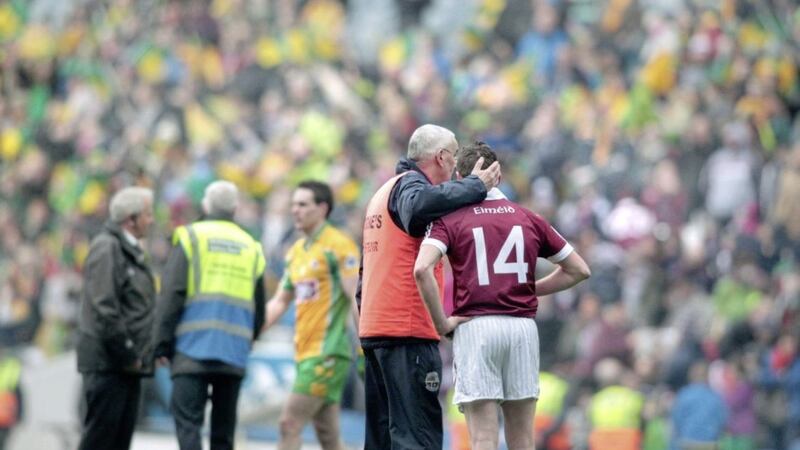FOR longer than he would care to remember, Liam Begley was an English teacher in St Patrick’s, Dungiven.
Master Begley was a student there on the first day it opened its doors in 1962. He returned 10 years later as a teacher and, barring three years spent as in an advisory role with the Western Education Library Board, his whole working life was spent in his own home parish.
To this day there are umpteen portacabins around the fringes of the main building, one of which was his base.
At one end of the school were the music and history departments. A pathway from there took you along the bottom end of the football pitches, out past the technology block and right around the other side of the mothership.
For those that occasionally got in trouble, this was the longest walkway to the principal’s office. It meant an entire lap of the school before facing your rap.
It also meant the hopeful possibility of being spied by Master Begley.
His portacabin was on the home stretch, and for most it represented the final hope of escaping proper censure.
Master Begley would have stood at the whiteboard, always tilted with one eye out the window in case he might spy some errant student coming to the end of The Green Mile.
Indeed, he even used to pop in the side door adjacent to his portacabin, which led on to the corridor in the main building.
He knew the figures that would regularly pass by his way and he would have known those that were straying close to the line with the upper authorities.
When it happened, he would excuse himself and the next thing, into the classroom behind him would come the bad egg.
Other times you’d come in for English class and they’d already be sitting there, having been collared earlier.
Except he wasn’t collaring them to punish them, but rather to save them.
As long as they did something useful and didn’t cause any distraction at the back of his class, he was happy for them to sit there all day, knowing that at least he had saved them from suspension or worse.
On one occasion, he reorganised exams to allow students a half day. A group of lads in the weakest class went out the gate and they weren’t to be seen again.
Except this day, they found a purse on the Main Street. It belonged to an old woman and had £330 in it.
They handed it in to the Post Office counter but, unsatisfied, made their way back up to the school to see Master Begley for his assurance that the lady would get her purse back.
The principal at the time wanted to give them a detention for returning to school, and sent the boys on to Master Begley with the instruction that he was to give them one.
They went to see Master Begley and he assured them the purse would find its way to the lady.
“And what about the detention?” they asked.
“Away you go, there’ll be no detention.”
And when the principal quizzed him as to why he hadn’t punished the boys, he replied that if he were principal, he’d have rung the bell, had a full school assembly, put the boys on the stage in front of the local press and recognised them for their good deed.
Master Begley’s methods were the very best in teaching.
They were the very best in decency.
He is the very best in humanity.
The fact that he still gets called 'Master', despite the term going out of fashion 30 years ago, tells you everything about how he is revered.
A Drumsurn man, he carried neither air nor grace. He taught the Queen’s language in an unashamed north Derry brogue.
People responded to him. Everyone, even the bad eggs, respected him. None that came under his wing would ever have forgotten him.
And isn’t that what the best teachers achieve?
Coaching sport is basically an extension of teaching.
The best coaches will get a response from their players not solely because of their methods on the field, but because of how they handle things away from the white lines.
Look at how Mickey Moran – who became friends with Master Begley when they crossed paths on their studies in Manchester - dealt with Slaughtneil the past four years.
He inherited a team whose discipline had let them down on occasion and who were regarded for their old-school manliness, whatever the consequences.
Into their lives stepped a quietly spoken former schoolteacher and, in seldom raising his voice beyond a conversational tone, he transmitted his message.
They had two red cards in four years of championship, one of which was rescinded.
But of equal importance was that he also worked closely with the two hurling managers he came across, Mickey Glover and Michael McShane, to ensure that the players got what was best for them in the round, rather than simply what was best for him.
As Rory Grugan highlighted in this paper last week, less has become more in many ways.
“There is an element of less is more at times. Sometimes the perception can be that you always need to do more, and boys will always be looking for that extra percentage, where you see the best teams maybe do that wee bit less when they need to and manage their time.
“We probably have seen a shift in terms of realising that if things are going better for you away from life, family and relationships, it’s likely that you’re going to be playing your best football at the same time,” said the Armagh captain.
The inter-county circuit requires such careful management now that one of the biggest challenges has become resisting the temptation to do more all the time.
Discipline is important in a team environment, but how it’s managed is even more so.
One size rarely fits all.
Master Begley knew that, and so he quite often got himself into bother to keep others out of it.
You wouldn’t find it on the curriculum or in the manuals, but isn’t the very essence of teaching or coaching being a good person, someone that others will respond to?








